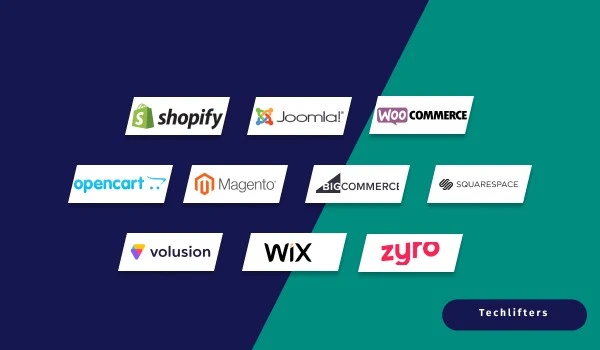Table of Contents
Overview
Building a functioning brand space for your business like that of an e-commerce website is a complicated yet effective process. It is a vital aspect that holds the potential to bring in big traction when built perfectly.
What is an e-commerce web builder? It is a comprehensive organization that helps build an online store from scratch offering customizable features, templates, patterns and designs. It is like a hardware store where you buy and store foundational items to build your online store. Finding the right builder that fits all your business needs is important as it sets the tone for further detailing.
An e-commerce site builder increases the ease of the process and helps build a valued platform for your business. Every online store builder is unique with its features, interface, design and use. Choosing the right creator not only enhances the chances of building the perfect online store but is also an appraised investment.
Every online store has its own set of specific requirements. This compilation of the top 10 Best ecommerce website builders in India is based on the criteria of key features of the builders, costs, pros and cons, and overall ratings, based on which you can decide on what is the best eCommerce website building platforms for your brand.
Top 10 Best eCommerce Website Builders In India for Online Business [2024]
- Shopify – versatile, all in one builder
- Magento – scalable, open-source platform
- WooCommerce – most used e-commerce creator
- Joomla – popular, open-source CMS
- OpenCart – unlimited everything, extensive
- BigCommerce – all in one solution
- SquareSpace – design-centric platform
- Volusion – earliest, traditional platform
- Wix – best drag & drop editor
- Zyro – affordable, creative builder
1) Shopify
Shopify is one of the leading e-commerce web builders that functions globally. It is known for its easy set up and management features. It is known for being tailored for businesses of all sizes and for simplifying the ever-growing complexities of creating and managing an online store.
Key features:
Shopify has a versatile platform that has an intuitive interface. This makes it highly accessible to beginners as it enables easy and efficient set-up and management of online stores.
It consists of a variety of customizable templates and seamless integration of payment gateways, making it unique yet simple to use.
Shopify’s versatility doesn’t end there. It comes with a good set of tools that help the website generate lucrative income after set up like marketing, SEO and data analytics.
Pros & Cons:
Shopify boasts of immaculate pros like that of,
- Versatile industry support
- Perfect for Drop Shipping
- Easy navigation
- Mobile friendly themes
It however lacks, with cons such as,
- Fees for payment gateway integration and other features
- Limited customization
- Expensive paid templates
- No email hosting
Cost:
Shopify offers pricing based on different tiers, called Basic Shopify, Shopify and Advanced Shopify costing ₹2,100 per month, ₹5,600 per month and ₹21,300 per month, respectively. Additional transaction fees apply for external payment gateways.
Note:
Shopify receives high ratings for its ease of use and comprehensive e-commerce features, making it a favoured choice for businesses of all sizes.
2) Magento
Magento is the top contender in the world of ecommerce solutions as it is highly distinguished with its versatility. It has quickly become the go-to choice as an online store builder due to its adaptability and industry options. It is highly preferable for business scalability and dynamic eCommerce websites.
Key features:
Magento has a modular architecture and allows easy customization and offers scalability that helps businesses of all sizes to accommodate their needs.
On Magento, multiple online stores can be managed from a single dashboard. This is suitable for big businesses with a diverse market presence as it allows for multiple storefronts with varied configurations to function seamlessly through a single panel.
Magento offers a high range of customization options. This enables businesses to tailor their stores accordingly, matching the brand vision ideally.
Pros & Cons:
Magento comes through with pros such as,
- Limitless customization
- Optimal Scalability
- Highly flexible
- Wide variety of features
Magento cons are,
- High platform & development costs
- Steep learning curve
- Resource intensive
- Time consuming
Cost:
Magento falls on the more expensive end of e-commerce web builders as it costs about ₹1.5L for basic projects. The costs increase along with the intricacies of the stores ranging from ₹5L to ₹15L.
Note:
Magento might require high level resource expertise to navigate and work with but still ranks high due to its high-quality features and adaptability.
3) WooCommerce
WooCommerce is the most advocated open-source e-commerce creator worldwide and has gained popularity very quickly. WordPress’s WooCommerce is one of the most used e-commerce platforms that is enabling to businesses of all sizes and boasts of a solid community that focuses on consistent improvement of the platform.
Key Features:
WooCommerce is a WordPress plugin that works on transforming websites to strong e-commerce platforms. Some key features of WooCommerce are, flawless product management, flexible shipping options, secure payment gateways and customizable design elements.
Pros & Cons:
Some pros of using WooCommerce are,
- Free source code
- User-friendly framework
- Convenient platform for every industry
- Easy integration
Some Cons of using WooCommerce are,
- Specific to WordPress users
- Hidden expenses
- No similar global experience
- No uniform upgrades
Costing:
WooCommerce is a free plugin but includes hosting costs of approximately ₹5,000-₹10,000 per year and hidden costs for extensions of about ₹5,000-20,000 each.
Note:
WooCommerce has its own comforts and challenges and is comparatively popular and equally challenging. Which is why it ranks at the higher middle end of the spectrum.
4) Joomla
Joomla is one of the most popular, open-source e-commerce web builder and Content Management System (CMS). It is known for its content management capabilities, versatility and a user-friendly interface. Joomla’s e-commerce support called Virtue Mart is powerful and is more popular than WordPress’s WooCommerce. It has highly effective e-commerce solutions. Virtue Mart extension gives a very healthy support for commercial brands looking to build a strong online presence.
Key Features:
Joomla is a highly flexible and versatile ecommerce website maker in India. It has an extension ecosystem that enables smooth functioning of many third-party extensions. Joomla is known for its user management which has a robust user access control, and also offers multilingual built-in support.
Pros & Cons:
Joomla is popular for its pros, such as,
- Premium templates
- Beginner friendly
- Best for SEO in the business
- Easy installation and set-up
Some cons Joomla comes along with are,
- Complicated interface
- Limited free extensions and templates
- Stuck up growth
- Doesn’t prioritize Backward Compatibility
Costing:
Joomla being open-source is free. However, costs may include domain registration of about ₹700-₹1500/year, hosting of ₹3000-₹8000/year, and professional themes or extensions of ₹5000-₹15000.
Rating:
Joomla can be used for a range of web development projects which makes it more popular and robust. It engages with a large community support which ranks it higher than most online store creators in India.
5) OpenCart
Similar to most online store creators we have discussed, OpenCart is also an open-source e-commerce platform. This essentially means you can download updates for free and don’t have to pay any fee every month. OpenCart is a global endeavour help build over 500k businesses and their online presence.
Key Features:
OpenCart is known for its unique user access feature that helps organize how and by whom the online store is accessed in the team, multi-store from single admin interface feature, back up and restore options, built-in affiliate system, among others.
Pros & Cons:
Pros of using OpenCart are,
- Pre-equipped features
- Multiple payment support
- Unique reporting system
- Easy store management
Cons of using OpenCart are,
- Requires technical expertise to navigate
- Limited scalability
- Incoherent installations
- Lightweight system
Cost:
While OpenCart is free to use in itself, it has to packs with plugins and extensions. The Accessory pack comes with a SEO pack pro costing ₹8,000 one-time fee and the pack with Pro Email Template costs ₹4,000 one-time fee.
Note:
OpenCart with its own flare of perks and falls, has a great community rating. The professional rating however, is not entirely unanimous on the positive side of things making it have an overall mid standing.
6) BigCommerce
BigCommerce has had the reputation as the all-in-one ecommerce solution that has options, variants, themes, stores and every element required for all scales of businesses. BigCommerce started off as the perfect solution for big enterprises but evolved into a platform that can be used efficiently by smaller businesses as well.
Key Features:
Among many incredible features, BigCommerce boasts of being SaaS – Software as a Service platform. This means that to use BigCommerce you do not have to have a separate software installed. The BigCommerce website or the mobile app are more than enough to get started.
Pros & Cons:
Major pros of using BigCommerce are
- Fast loading
- No transaction fees
- Unlimited variants
- Convenient 3rd party integration
Cons of using BigCommerce are
- Limited subscription features
- No e-mail marketing
- Complicated customization process
- Difficult multi-user functionality incorporation
Costing:
BigCommerce offers a 4-tiered pricing system. The Standard plan costs approximately ₹1,280 monthly, The Plus Plan costs ₹4,350 per month, The Pro plan costs ₹12,000 per month while The Enterprise Plan has a custom cost plan for big businesses with high volume needs.
Note:
In terms of ease, choice, variants, integration, drop shipping etc, BigCommerce stands a solid stand on the top because of its flexibility and scalability and more easily workable elements.
7) SquareSpace
SquareSpace is popular because of how great the websites turn out to look. It is a design-centric platform that has a significant user-friendly interface that makes it simpler and more interesting. It is known for producing great mobile friendly websites while offering a robust range of e-commerce tools.
Key Features:
SquareSpace has been updated recently and has seen significant changes and upgrades. Some of the features offered are custom payment settings, automatic e-mail reminders, Squarespace AI, custom intake forms among many others.
Pros & Cons:
Pros of working with SquareSpace to build your online store are –
- Unlimited publication ready templates
- Convenient back-end design
- Accessible customer support
- Drag and Drop interface
While the cons are –
- Comparatively expensive
- No advanced marketing tools
- No free plans
- Complicated 3rd party CDN play
Cost:
Squarespace’s pricing starts at around ₹600 per month for personal use and goes up to ₹2,000 per month for advanced e-commerce features.
Note:
SquareSpace stands as a top choice for aesthetically pleasing websites and ecommerce spaces. Because of its not so flexible and certain inconvenient elements, SquareSpace stands mid in the overall ratings
8) Volusion
Volusion is one of the earliest Online Store Builder that was created. Volusion is a standard choice and has been one for years. It has helped about 300,000 stores have an online presence.
Key features:
It has a solid system that enables online stores looking for more traditional features in terms of selling and analytical tools, but has certain limitations in design and detail implementation. It has a range of built-in features and is known for its secure hosting.
Pros & Cons:
Pros –
- Excellent customer support
- Manageable through their mobile app
- Intuitive dashboard
- Competent security
Cons –
- Immoderate pricing
- Not entirely user-friendly
- Poor analytics and CMS implementation
- No blogging facility
Cost:
Volusion’s pricing is of 4 tiers of personal, professional, business and prime. It starts at around ₹2,500 per month for the Personal plan, going up to ₹17,500 for the Business plan. The Prime tier is custom pricing.
Note:
Volusion is due for major updates and it is visible which makes it a not so often but effective choice. It offers a balance of features and scalability but comes packed with limitations as well. This puts it on the lower end of the ratings.
9) Wix
Wix is a reknowned website building platform, unique to its features and flexibility. Wix comes through as an ecommerce builder with its big native apps – Wix Bookings, Wix Stores and Wix SSL.
Key Features:
Key features of Wix are not limited to diverse templates but also extend to product display, inventory management, secure payment processing, drag and drop interface, along with being an extremely user-friendly platform.
Pros & Cons:
Pros of working with Wix are –
- Comprehensive features
- Attractive templates
- Abundantly customizable
- Moderate pricing and support
Cons of working with Wix are –
- Not flexible
- Unsuitable for big businesses
- No external 3rd party plugins
- Basic store navigation
Cost:
Costing at Wix is dreamy and comes in 5 plans. Light costs ₹199 per month, Core ₹399 per month, Business ₹799 per month, Business Elite costs ₹1,599 per month and the Enterprise plan is custom along with all perks of the Elite plan.
Note:
Wix stands quite high on the ratings because of its simplicity and pricing making it accessible to all business scales.
10) Zyro
Zyro is a Hostinger-owned ecommerce website builder. It is fairly new in the market and currently hosts a diverse set of features at affordable prices making it accessible to small businesses. It is known for its quick set up and simple interface.
Key Features:
Zyro is a simple yet effective online store builder that boasts of being ultra-useful in many ways. It offers integrations with over 70 payment gateways. Zyro offers high quality easily customizable templates.
Some other key features of Zyro are that it offers complete order tracking, shipping and tax management, inventory management and more.
Pros & Cons:
Zyro boasts of pros like,
- Extremely easy usage
- Simplifies digital marketing
- Incredibly affordable
- No commission fees
There are developmental cons like,
- Cannot switch templates
- Not mobile friendly
- Adding content is time consuming
- Needs more updates
Costing:
Zyro is known for its affordability. It has tiers similar to Shopify. The basic and unleashed plans cost less than ₹500 per month, the e-commerce plan costs ₹825 per month and ecommerce plus plan costs ₹1,240 per month.
Note:
Zyro is impeccably suited for small business owners and beginners to own online stores. Its versatile features at affordable pricing rates it comparatively higher.
Must have Features of ecommerce website
There are some certain factors that every ecommerce website should have. Here are some of the must-have ecommerce website features:
1) Mobile friendly website
As we know in this digital era with day to day increasing technology we find new devices with a lot of cool features . Most of the users search for information through mobile devices, so adapting to Mobile Responsive is most crucial for any website.
It helps to gain a better user-friendly experience. Having a mobile-friendly website will increase your Google ranking as well as your sales.
2) Good Quality Images & Videos
In older days we were posting only one photo of the product and explaining its features in paragraphs, Now customers expect more information about your products.
Try to give your best to make your customers satisfied with your product information. Provide multiple Images with high resolution.give an option for zoom the image to get a feel of the product.
3) Navigation
Make sure your not confusing your customers with providing unnecessary navigation.it makes customer frustrated and they may leave the site. Navigation should be very simple , customers can get the details with easy clicks. Navigation should be intuitive and logical. If navigation is smooth then it may convert user into potential customers.
4) Advanced Search and Filtering
Customers will expect what they are looking should be available within few clicks. Product searching and filtering is must features of ecommerce website.
Filters allow users to minimize the options with relevant products that they are looking for with prices, Quality,Color, Size etc.
and advanced search can make the customers work simple, if they type first 2 letters of the product and website will predict what they are searching for and show results as they type.
5) Security Features :
Website security is most basic consideration in ecommerce web development Most people are scared to do online transactions through e-commerce sites,and most of the e-commerce business owners do not take this seriously it leads to massive problems.so analyse the security issues in your website to provide the trustable source for your customers.
Make sure you have integrated SSL with your website, Initialise two factor authentication to provide double your security layer, and Give the link of privacy policy about customer data is not shared with any third-party sites.
Conclusion
Building an online store is an exciting task. Too many check points to remember while navigating the e-commerce space and too many right choices to make. It is important to be sure of the right e-commerce web-builder choice one would make for their business.
Our comprehensive list of the best ecommerce website builders in India currently with details discussing the key features, pros, cons, costing and ratings is one to consider to make a side-by-side comparison of the options and make the right choice according to your business needs.
FAQs
1) What are the key features to consider when choosing an e-commerce website builders?
When selecting an e-commerce website builders, ensure features like user-friendly interfaces, responsive design options, secure payment gateways, and strong SEO capabilities are accessible. See if the platform supports scalability, diverse product types, and provides efficient customer support to create an easy online shopping experience.
2) How does the choice of an e-commerce web builder impact search engine rankings for an online store?
The choice of an e-commerce web builder significantly influences SEO. Choose platforms with a clean code, mobile responsiveness, and effective URL structures. Ensure the platform facilitates meta tag customization, image optimization, and sitemap generation. A well-optimized e-commerce website enhances visibility on search engines, driving organic traffic and boosting overall online presence.





